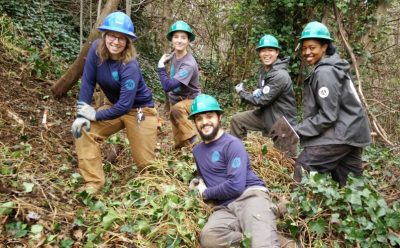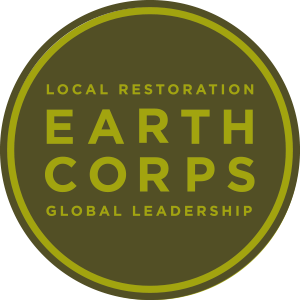Building my Career
It is now a year since I ventured out from the EarthCorps community into an unknown future. I would say I ventured away from the community, but the truth is EarthCorps has remained in my life as cherished memories and hard learned lessons.
Now, in December, at the freezing-dreary end of the year, it is common for people to reflect on the previous year and be thankful for some aspects, while resolving to do better in other areas. I am no different. The following is my story and my advice for future corps members.
EarthCorps has remained in my life as cherished memories and hard learned lessons.
EarthCorps provided me with an instant connection, as well as a landing pad, to this Pacific Northwest landscape and its people. I remember first hearing of EarthCorps from my dear friend Claire Delbecq while we were in the Student Conservation Association (SCA) in New Hampshire in 2014. Claire, a Bellingham native, always showed me pictures of Washington and told me stories about the rain and the mountains. Needless to say, I was enthralled with idea of spending another year of national service in Seattle. We both applied and were offered corps member positions. In January 2015, Claire picked me up at SeaTac Airport and thus began the Washington chapter of my life.
To be frank, I wasn’t expecting to learn a whole lot at EarthCorps. I thought that I was going to work incredibly hard, and in return I figured anything else was secondary.
As it would turn out, I learned a lot.
Before EarthCorps, I thought I was a proficient communicator, but I found out (sometimes in uncomfortable or awkward situations) how to listen. Particularly, I had to discover how to listen to the impact that I have within a community, especially as a white, cisgendered male.
 I thought I already knew what I could offer a community: lots of energy, a loud voice, an example of hard work, or just a funny dude to be around. However, although I knew what I brought to the situation, you might say I found out what I could take away from a community when I put myself first. Admittedly, this was a daily, sometimes hourly, challenge to overcome. My saving grace, I suspect, was that I sought out the staff whenever I struggled and there was always time to discuss new leadership practices or new insights for personal growth. Knowledge I am very thankful for. All of it.
I thought I already knew what I could offer a community: lots of energy, a loud voice, an example of hard work, or just a funny dude to be around. However, although I knew what I brought to the situation, you might say I found out what I could take away from a community when I put myself first. Admittedly, this was a daily, sometimes hourly, challenge to overcome. My saving grace, I suspect, was that I sought out the staff whenever I struggled and there was always time to discuss new leadership practices or new insights for personal growth. Knowledge I am very thankful for. All of it.
I didn’t expect I would grow as a leader, and I definitely wasn’t expecting that I would be encouraging other people to grow as leaders, too.
All of this is knowledge that I use in my personal life and current occupation.
Learning to facilitate positive group dynamics is very instrumental when the majority of my work nowadays is highly collaborative. EarthCorps can prepare you well for  leadership roles through focusing on positive communication, social equity, and community engagement.
leadership roles through focusing on positive communication, social equity, and community engagement.
Since EarthCorps ended for me, I have been assisting the mission of other environmentally-focused non-profits here in Seattle. I spent four months analyzing transportation and development policy as an intern with Forterra. I then moved on to be a crew leader for a Mountains to Sound Greenway Trust trail crew on Mailbox Peak. Currently, I am working for the Mountains to Sound Greenway Trust doing research on a volunteer basis, waiting for the snows to melt and the trails to open.
My experience would say it is not about finding a career after EarthCorps, but rather building a career through professional contacts, seasonal-temporary opportunities, and sometimes an unpaid internships. Uncertainty and empty stomachs may occasionally confront you, but stay the course.
Another realization during my year was how valuable and extensive the professional connections and network around EarthCorps is. Being able to hold a conversation with a supervisor, peer or colleague, or a potential reference is a vital skill to your next steps.
As young people, and I have been guilty of this myself, our temptation is to hope that social media and email is enough to get us in the door, bring on progressive change, or land us that dream gig. In fact, it can take much more effort. The truth is, sometimes it requires meeting someone for coffee or making phone calls. A good place to practice these skills is meeting the staff for one-on-one’s. All of the staff at EarthCorps are full of references and contacts that will happily meet with you, too.
Of course, each individual year at EarthCorps is unique, as is each individual’s year afterwards.I understand any advice I could offer to the reader may not resonate to someone of a different story. Still, at least for me, the following would have been influential.
First, I would warn someone against joining EarthCorps in the hopes that it is a ticket to guaranteed employment in the environmental sector in Seattle; it takes far more than that. The personal and professional skills you gain here are beneficial, but there have been other cohorts, other corps, and many other people who are mission-driven and paying their dues also.
It’s important to view your time as a corps member as more than job-training. You are incredibly fortunate to be surrounded by an exceptional group of compassionate and exciting young adults. Be open to connecting with your cohort as more than work colleagues and enjoy not only sharing in the day’s hard work but also the times spent in camp or during your off time. Now a year later from EarthCorps, I have seen a once tightly knit group disband. I think some people find that unsettling, but I am proud to see where previous corps members end up. Their good intentions fill me with hope for a better world, and their dynamism gives me the motivation to be the change as well.
Thank you for reading and I cannot thank the EarthCorps community enough for inviting me and welcoming me to Washington. The Washington Chapter of my life has been such a cherished adventure.

